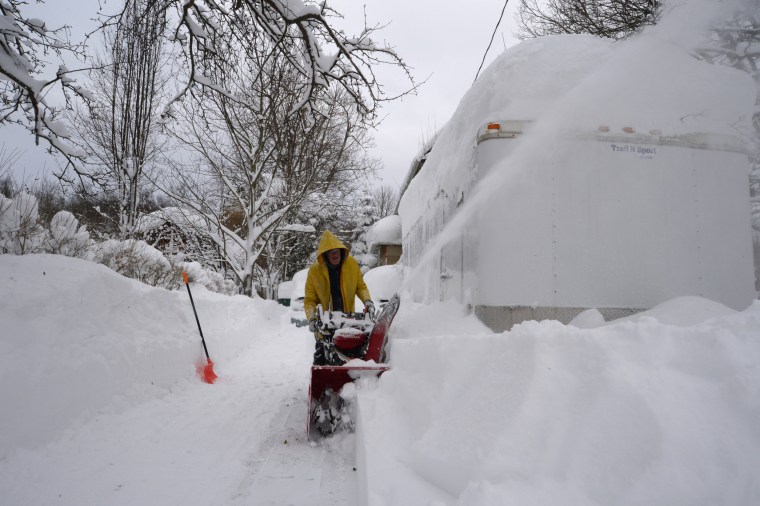The death toll from the historic blizzard across the U.S. climbed to 65 on Tuesday as record snowfall blocked roads, hindering rescue operations, officials said.
Confirming seven additional deaths in Buffalo, Mayor Byron Brown said on MSNBC's "Morning Joe" that the storm was "probably worse than anything that this city has seen in over 50 years."
At a Zoom news conference later Tuesday, Brown said another body had been recovered. By the end of the afternoon, Erie County's medical examiner had confirmed three additional deaths, raising the storm-related death toll to 32 for the county, which recorded the vast majority of New York's 34 deaths.
Even though a driving ban was in force in parts of the Buffalo area, "we still are finding a lot of people out and about just hampering our efforts as first responders," the city's public works commissioner, Nathan Marton, said Tuesday morning on NBC News Now, adding that the department was trying to clear at least one lane for emergency vehicles.
Brown said, "We need people to continue to stay patient, stay off the roads today, and as soon as we can, we will lift the driving ban in the city of Buffalo.”
Erie County, which includes Buffalo, was at the center of the storm's most intense, blinding conditions. With wind, it felt like minus 13 at Greater Buffalo International Airport over the weekend, according to National Weather Service data.
Erie County Executive Mark Poloncarz said Tuesday that 17 of the people who died in the county were found dead outdoors, three were in vehicles, and three had been clearing snow. Seven had no heat, and one may have died as paramedics struggled to reach him because of poor driving conditions, he said.
Officials said Sunday that Buffalo's first responders were all but shut down — a first — because roads had disappeared under snow.
Poloncarz noted that civilian motorists had been prohibited on Erie County roads during the statewide storm emergency.
The ban was reduced to an advisory for parts of Erie County on Tuesday, but it remained in effect in Buffalo and Lackawanna, Poloncarz said in a statement.
The forecast for areas south of Buffalo included the possibility of an additional inch of lake-effect snow Tuesday before the precipitation ends.

Since July 1, Buffalo has had at least a hundred inches of snow, making it the snowiest start to any season on record.
Lake-effect snow occurs when cold air passes over the unfrozen and warmer lake water, transferring moisture and warmth to the lower parts of the atmosphere. The air then rises to form clouds, resulting in intense snow.
The historic cold will most likely give way to unseasonably warm temperatures, with Friday's highs for the Buffalo area expected to reach the 50s, about 20 degrees above normal, the National Weather Service said.
President Joe Biden on Monday approved an emergency declaration for New York.
Nationwide, temperatures plummeted and huge snow drifts left cities in whiteouts resulting in power outages and cancellations of thousands of flights. Residents were trapped in their homes without food.
New York State Electric & Gas data Tuesday indicated that thousands of customers in Western New York who were left in the dark by the storm had restored access to electricity, with only a handful reporting no power Tuesday evening.
More than 2,000 customers in Erie County remained without power after night fell Tuesday, according to the blackout tracker PowerOutage.us. Brown, the mayor of Buffalo, said Tuesday morning that 20,000 had been without power before restoration efforts lit up the city.
Stretching from the Great Lakes near Canada to the Rio Grande along the Mexican border, the storm had killed more than 60 people as of Tuesday morning, according to an NBC News tally. The deaths were recorded in 12 states: Colorado, Illinois, Kansas, Kentucky, Michigan, Missouri, Nebraska, New York, Ohio, Oklahoma, Tennessee and Wisconsin.
Thousands of flights into and out of the U.S. — most of them on Southwest Airlines — were canceled Tuesday, according to the flight-tracking website FlightAware.
Southwest canceled 2,900 flights Monday, the travel-heavy day after Christmas, amounting to 70% of its entire schedule, stranding furious passengers across airports.
In Jackson, Mississippi, broken pipes left thousands of residents without running water Monday as the city struggled to return pressure to its frail water system.
The storm was expected to gradually improve over the week, forecasters said.
“Lingering lake-effect snows downwind from Great Lakes will become less intense and fade on Tuesday,” the weather service said in its 2:59 a.m. ET bulletin Tuesday. Temperatures in the East and the Midwest were also expected to moderate over the next few days, it added.
